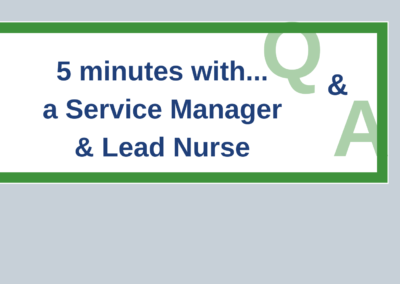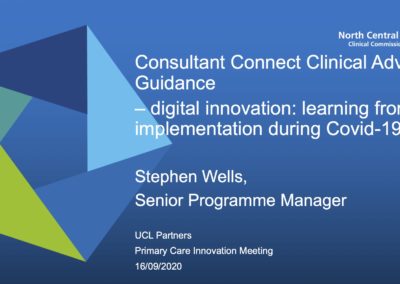‘Rapid access to consultant advice is the way forward, both for patient care and health system finances.’ – Dr Udi Shmueli
Enhanced Advice & Guidance provided by Consultant Connect has been available to NHS healthcare professionals in Northamptonshire since 2016, connecting users to specialists for rapid advice via telephone, photo and messaging. We spoke with Dr Mary Dell, a local GP, to find out why she likes using the service.
‘It’s a very helpful service and it’s great to know that there is speedy access to advice from consultants. The service gives me rapid answers – which is particularly helpful in cases where admission may be needed.’
– Dr Mary Dell.
Patient Example
‘I required advice for a patient who was suffering from leg oedema and had known cardiovascular disease. I wondered if the patient was experiencing left ventricular failure as their ECG was grossly abnormal. My paramedic colleague and I were unsure whether the changes were acute or due to the patient’s pacemaker. There were no previous ECGs on the patient’s record to compare to, which made it much harder to work out if the problem was acute.
I used the Consultant Connect App to send the patient’s ECG images via the IG-secure clinical photography feature, PhotoSAF, to Dr Patrick Davey who is a local cardiologist. Dr Davey was happy to reassure me that the ECG by itself was not concerning.
‘Dr Davey rang me within minutes of receiving the ECG and followed up with a written response. He provided very prompt and helpful advice.
‘The patient benefited from the input of a specialist whilst avoiding an unnecessary trip to the hospital. The patient was reassured, and both the patient and I were relieved.’
We also spoke with Dr Udi Shmueli who is a consultant gastroenterologist at Northampton General Hospital and provides Advice & Guidance to local clinicians, as well as to out-of-area clinical colleagues on the National Consultant Network (NCN).
‘This service ensures the provision of timely advice, which helps patients get the right care faster. It helps avoid unnecessary admissions and referrals, as well as fast-tracking patients who do need an admission or referral. The care of patients who don’t fit the two-week wait criteria can be expedited. It also helps bridge the gap between Primary and Secondary Care, improving clinician relationships and communication.’
– Dr Udi Shmueli.
How has your team’s workload been impacted by answering Advice & Guidance calls?
‘The calls are brief; a few minutes at most, so time is not an issue. I do sometimes interrupt clinic consultations to answer them, but patients don’t mind. I book extra patients into lists or clinics in response to GP calls that are followed by an email. This does sometimes lead to extra work, but it’s work that would have happened anyway. This is just an easier way for GPs to locate me. The ability to use and share my knowledge, the gratitude from my GP colleagues, and the validation of feeling helpful and improving the care of our patients is very gratifying.’
How do you find using Consultant Connect?
‘It is easy to use and if the time of a call is inconvenient, I don’t have to answer as there are other colleagues on the rota. I really enjoy using Consultant Connect. I’m asked questions I can easily answer, helping to improve patient care and the gratitude of colleagues boosts my mood. I take about 15 calls per week, and, in any case, it is a pleasure to talk to caring intelligent doctors who just need simple advice to move care forward.’
Did you or your team have any reservations about using Consultant Connect?
‘Some colleagues were initially worried about medico-legal issues arising from the call if no notes were taken. However, the calls are recorded, and it’s perfectly clear that primary responsibility remains with the GP. I don’t accept referrals or take any responsibility for the patient from the phone call, so I don’t need to take notes. If I feel I need to see the patient urgently, then I will ask the GP to email my office.’
What types of queries do you receive?
‘Examples include what treatment to start for exacerbations of IBD, management of microscopic colitis, post-cholecystectomy diarrhoea, interpretation of LFTs or hepatitis serology. Rapid access to consultant advice has to be the way forward, both for patient care and health system finances. Questions surrounding how urgent a referral should be, and whether my advice can be used to support a two-week wait or CT referral. If a GP in my locality phones with a patient who is likely to have a new presentation of IBD or something else equally urgent, I then ask for an emailed referral with the details and arrange the appropriate investigation.’





